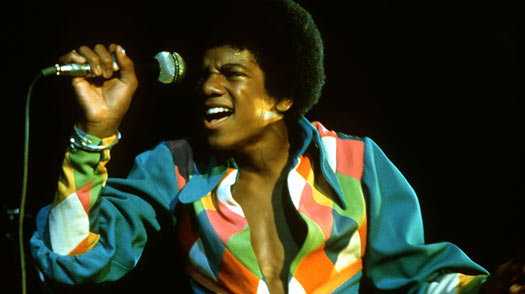
Michael Jackson performs in 1980.
(3 of 3)
He told Winfrey that he was a "lonely, sad" child, "having to face popularity and all that. There were times when I had great times with my brothers, pillow fights and things, but I ... used to always cry from loneliness."
Oprah: "Beginning at what age?"
Michael: "Oh, very little, 8, 9."
And even as the Jackson 5 were blazing to glory, anyone with eyes to see could predict that the group wouldn't last long. There was such an imbalance of talents — four mortals and this freakishly powerful fifth. Typical of Motown acts, the Jacksons were pressed into an ensemble, from their choreography to their lyrical trade-offs to their matched outfits. But whenever young Michael eased out of the spotlight and into formation alongside his brothers, the whole act sagged. It was like hitching a Derby winner to a farm wagon, and you could see him trying to hold himself back until, after a few bars, sanity prevailed and he would burst again to the front where he belonged.
Because he was so young, and because he made performing look so easy, and perhaps because he was a young black man in a country whose President (as we recently learned from newly released Nixon tapes) believed abortion was necessary to prevent blacks and whites from having children together, a lot of people figured Michael Jackson just happened, a force as inexplicable as music itself. Berry Gordy, a most calculating man, recognized, however, that there was nothing accidental about Jackson. "Michael's always been different," Gordy once said. "He's more intense than anybody. He's made a science out of this."
And so, even as the Jackson 5 spun off a Saturday-morning cartoon and cranked out more hits, the group's star steered himself into a solo career. His first No. 1 hit, tellingly, was a slightly creepy yet nakedly beautiful love song about a lonely boy and his best friend, a rat named Ben. This from a boy who was already filling his family's Encino, Calif., estate with pets — a boa constrictor, peacocks, parrots.
There was one challenge that neither talent nor calculation could overcome. When puberty hit, his voice dropped, he gained weight and his face broke out. "I had pimples so badly it used to make me so shy. I used not to look at myself. I'd hide my face in the dark, I wouldn't want to look in the mirror, and my father teased me and I just hated it and I cried every day," Jackson told Winfrey. He imagined he was fat and ugly. He adopted a vegetarian diet that his older brother Jermaine touted as an acne cure. It was a short step from there to his first visit to a plastic surgeon. Adolescence — the loss of that cute kid he had been, the unmoored search for a suitable way to be an adult — "messed up my whole personality," he acknowledged.
But while Jackson wrestled with an emotional transition common to child stars, he retained his artistic confidence. In 1974, as disco threatened to bury sweet-voiced boys in the music business, the Jacksons appeared on Soul Train to introduce their new single, "Dancing Machine." It was an altogether funkier Michael Jackson doing the singing. Midsong, his face went blank as he popped through a jaw-dropping dance move called the robot. It was his own invention, the product of long hours of cunning physical engineering, nothing borrowed from James Brown. The song was a smash; the robot, a sensation. And Michael Jackson was done being a prodigy and on to something bigger.
Musician Lenny Kravitz was a child when he saw the Jackson 5 at Madison Square Garden. "It was the first concert I'd ever seen, and they were wearing these knicker pants with boots that came up to the knees. So I would put galoshes on and dance around the living room and pretend that I was Michael Jackson," he recalls.
"If he had just done what he did as a child, he would still be the genius that he is considered today," Kravitz sums up. "Because it is not natural for a child to sing that way, to sing with that amount of depth, with that amount of emotion, with that amount of interpretation, the pitch, the purity and the feeling. The only kind of musician I can compare that to is Mozart."
But while we call these "gifts," there is a point at which the gift is just too large, talents impose themselves as burdens and barriers, and distinction shades irretrievably into alienation. Which feels to a sobbing boy like an eternity of loneliness. —With reporting by Alex Altman, Kristi Oloffson and Julie Rawe